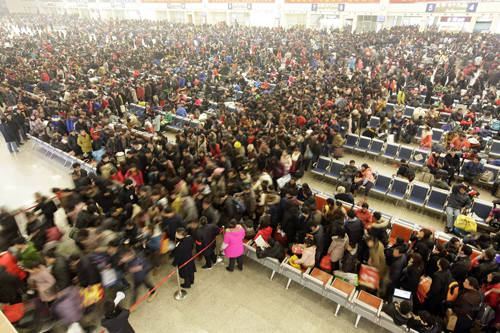|
 |
|
PEAK TIME: Passengers wait in queues to get on the train at a railway station in Wuhan, capital city of central China's Hubei Province, on January 15, 2012. The number of passengers hit a record high for the station (XINHUA) |
Big crowds and foul air on the train, frighteningly long queues and fierce clashes at the station...these are common scenes during China's Spring Festival travel rush. The annual travel peak is known as the world's biggest human migration. This year's stampede is still ongoing. Lasting over 40 days, people began returning to their hometowns on January 8 and the final stragglers will make their way back to the cities by February 16.
The railway is the major means of transportation during the period. Although its capacity to transport people has been strengthened by newly opened express routes, the situation for most passengers remained extremely difficult.
"Although the railway's transport capacity exceeded that of previous years, it still couldn't meet the demand," said Hu Yadong, Chinese Vice Minister of Railways.
"The difficulty in organizing transportation for the Spring Festival was in fact bigger than previous years as passenger flow surpassed transport capacity," said Liu Tienan, Deputy Director of China's National Development and Reform Commission (NDRC).
The Ministry of Railways (MOR) initiated a number of measures to deal with the seasonal surge in demand. It introduced telephone ticket booking and real-name online ticketing services to prevent ticket scalping. Additional temporary train services were also introduced to relieve the huge transport pressure.
However, these efforts failed to save the ministry from extensive criticism and accusations that it did not do enough to deal with passenger demand. Many travelers said they found it extremely difficult to get tickets home for the Spring Festival and to return to work after the festival.
The ministry however claimed that it had used every single means at its disposal to increase transport capacity during the festival.
The average number of train departures hit 2,064 pairs a day, a record high for festival transportation and an increase of 131 journeys compared to the period before the festival. Some 5.88 million passengers were being conveyed per day. The ministry estimated the total number of train passengers would reach 235 million, an increase of 13.52 million, compared to the previous year.
The sheer number of people traveling during the festival has drawn considerable attention to the reasons behind the human stampede that takes place every year. Why do so many people choose to travel during the festival?
This is due to two realities in China. The first is the imbalanced economic development between different regions. Many people from central and west China work in economically developed eastern coastal cities or major cities such as Beijing and Shanghai.
According to China's National Bureau of Statistics, of Shenzhen's total population of 14 million, 12 million are migrants; and of Beijing's total population of about 20 million, more than 7 million are classified as floating. And this floating population mainly consists of migrant workers.
The other reality is the strict difference between having an agricultural and non-agricultural registered permanent residence in China. It is hard for migrant workers to register as permanent residents in the cities that they work in. Therefore millions of people work in cities, while their families remain in their hometowns.
Since the Spring Festival is the most important traditional holiday for the Chinese people, the vast majority of people choose to spend the festival with their families and are therefore prepared to travel home, regardless of the difficulties they face in terms of transport.
Thus a mass migration is formed. Shortly before the festival, a huge number of migrant workers travel to inner China from eastern coastal cities. Then after the festival, they go back to eastern coastal cities to make a living.
The huge traffic load is the result of so many people traveling within such a short period of time.
To meet the demand for transportation, China has greatly increased its investment in road and railway construction projects over the past few years. According to statistics released by the NDRC, in 2011, China added 11,000 km of expressways. In total, China now has 85,000 km of expressways, just behind the United States.
| 